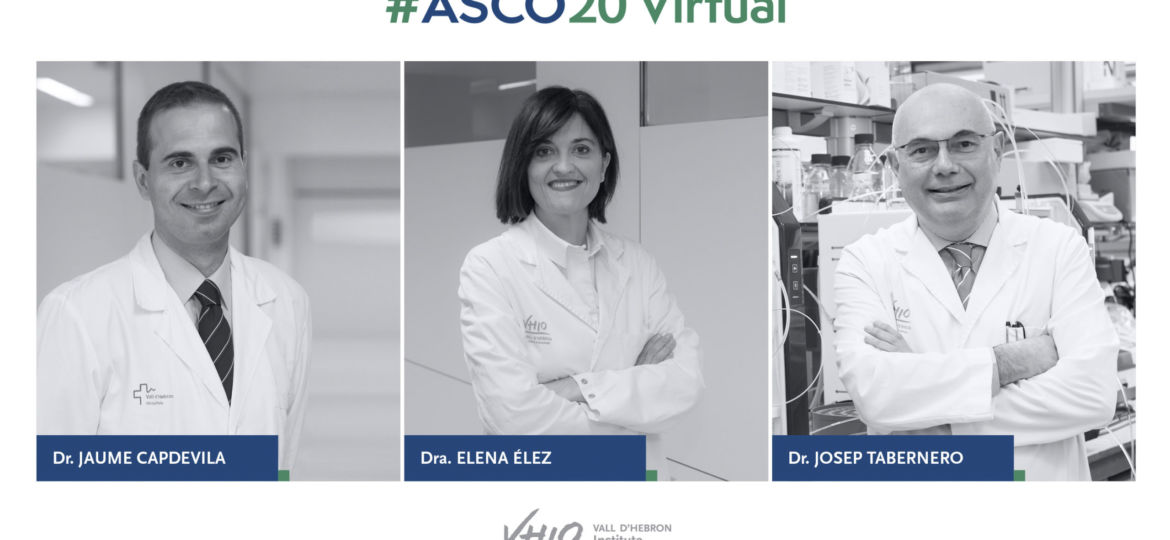
Barcelona, May 29, 2020.- VHIO researchers have taken part in important new studies on colorectal cancer that could improve clinical practice and change patients’ lives. The results of their work are being presented at this year’s congress of the American Society of Clinical Oncology (ASCO), being held online.
There are more than 1.8 million cases of colorectal cancer in the world every year and research is vital because this figure is expected to carry on rising over the next few years because of the increase in the population of elderly people and the adoption of unhealthy habits and lifestyles.
New option for metastatic colorectal cancer
The number of cancer drugs and treatments is increasing. However, in some patients tumors are developing resistance and, for this reason, great efforts are being made to find new drugs that offer alternatives when this happens. This is the case with DS8201, a conjugated antibody (trastuzumab-deruxtecan), which has shown promising effectiveness in patients with metastatic native RAS/BRAF colorectal cancer, refractory to standard treatments, who are expressing HER2.
Dr. Elena Élez, a researcher from the Gastrointestinal and Endocrine Tumors group at the Vall d’Hebron Institute of Oncology (VHIO), has taken part in the DESTINY-CRC01 trial, a multicenter open phase II study assessing the results of this drug in patients who have already received two or more treatments and whose tumors have progressed. “Once again, knowledge of tumoral biology turns out to be crucial for the development of new therapeutic strategies. The compound has shown interesting activity in metastatic colorectal cancer without RAS/BRAF mutation and with over-expression of HER2. Although this is a very select population, it offers an effective potential alternative treatment for these patients. This is of particular interest as these are diseases with tumors that are refractory to standard treatment,” said Dr. Élez.
This new drug, DS8201, combines two ingredients. Firstly, it has an antibody aimed at HER2, a gene with a key role in the growth and normal division of cells but, when overexpressed in cancers, generates a more aggressive tumor and greater resistance to conventional treatments. Secondly, it also incorporates a topoisomerase I inhibitor – an enzyme that controls the manipulation of the DNA structure necessary for replication.
To carry out the study, patients who taking part in the trial were divided into three groups depending on their degree of over-expression of HER2. “We have been able to show that the best results are obtained in patients with the highest level of amplification of HER2. In these, a 43.5% response rate was observed, together with a disease control rate of 83%. Progression-free survival of 6.9 months was achieved,” said Dr. Elena Élez, who pointed out that this data seems to indicate a very direct relationship between the drug and the level of expression of HER2.
Rectal cancer surgery could be avoided
Surgery is one of the most common treatment options for most tumors. However, the consequences of this treatment can be side effects lasting a patient’s entire life. For this reason, options are increasingly to minimize the need for these actions are increasingly being sought. This is one of the options explored in the RAPIDO trial whose first results have been presented at ASCO. Dr. Jaume Capdevila, a researcher from the VHIO’s Gastrointestinal and Endocrine Tumors Group, is one of the researchers involved.
Until now, the standard treatment for locally advanced rectal cancer has consisted of initial radiotherapy and chemotherapy followed by surgery and finally adjuvant chemotherapy. This method of dealing with these cancers achieves 15% complete responses. “But it also causes many problems when the adjuvant chemotherapy is administered, as the patients are in a convalescent condition after surgery,” said Dr. Capdevila.
The RAPIDO study assessed a new way of dealing with these locally advanced rectal tumors. The new strategy, known as total neoadjuvant therapy or TNT, consists of administering all the necessary treatment before surgery. First, short course radiotherapy is applied, followed by consolidation chemotherapy, and finally surgery. “This avoids the need to administer chemotherapy after the tumor resection, which is when the patients are in a more delicate state. We also reduce the duration of the treatment from 10 to 5 months,” added Dr. Capdevila.
The results which have now been presented at ASCO show that this new strategy managed to double complete pathological response rates and significantly increase disease-free survival. “All this opens the door to a new concept – the preservation of the body. We must not forget that rectal cancer surgery is highly mutilating with life-long side effects. In the patients where there has been complete clinical response, the probability that it really is complete pathological response is very high. They could be considered to be cured, and in this way surgery might be avoided,” said Dr. Capdevila. He noted that the results of the RAPIDO study indicate that one in three patients treated achieves this complete response. “The next challenge will be to identify these patients correctly and not to operate on them, which will change rectal cancer treatment completely,” concluded Dr. Capdevila.
_________________
Dr. Elena Élez and Dr. Jaume Capdevila belong to the VHIO’s Gastrointestinal and Endocrine Tumors Group led by Dr. Josep Tabernero








